Reprinted with Permission from the Pharmaceutical Research and Manufacturers of America
In Medicare Part D, the six protected classes policy protects vulnerable seniors and low-income beneficiaries with serious and complex health conditions, while also allowing Part D insurance plans to use the tools they need to control costs. Medicines for some of the sickest patients in Part D are covered within the six protected classes, including those for cancer, epilepsy, HIV/AIDS and mental illness. Many of these conditions require patients to attempt a variety of therapies before they and their doctor settle on the most appropriate treatment, so there is no one-size fits all medicine for these conditions.
Unfortunately, the Centers for Medicare & Medicaid Services (CMS) has issued a proposed rule that would weaken the six protected classes by allowing Part D plans to restrict access to medicines by: using prior authorization or step therapy for patients already stable on a six protected classes medicine, including patients who are taking HIV/AIDS medicines; excluding a protected class drug if the drug is simply a new formulation regardless of whether the old formulation is still on the market; and excluding a drug from the protected classes if its list price increased more than general inflation.
New data from IQVIA’s US Market Access Strategy Consulting team highlights how plan sponsors are already using the tools they currently have to manage costs and how devastating these changes could be to many seniors and low-income beneficiaries who rely on the six protected classes for their treatment.
Currently, plans have ample opportunity to use utilization management tools to contain costs and influence the medicines new patients begin their treatment with in the protected classes, with the exception of HIV patients. For HIV, CMS historically has not permitted plans to use utilization management for patients new to therapy because “utilization management tools such as prior authorization and step therapy are generally not employed in widely used, best practice formulary models” for HIV (CMS, 2010). Analysis of IQVIA’s longitudinal patient claims data finds that, depending on the class, between 27 percent and 48 percent of patients taking a medicine in one of the five non-HIV protected classes are new to treatment in a given year.
Changes to the six protected classes impact Low Income Subsidy (LIS) patients heavily as they make up a substantial portion of beneficiaries within the six protected classes, particularly within the mental health and HIV/AIDS classes. LIS beneficiaries have limited income and resources so they are eligible for extra help to access their medicines. For example, in 2019, for beneficiaries to be eligible for LIS their annual income is limited to $18,210 for an individual, or $24,690 for a married couple living together. That means for LIS patients it is that much more important that the six protected classes provide access to required medicines for their complex condition because they do not have the disposable income to pay for them without coverage.
IQVIA found that LIS patients represent more than one in four beneficiaries across the protected classes; and for certain classes it can be as high as 65 percent of patients. Therefore, if the changes proposed by CMS were implemented, jeopardizing access to the drugs in the six protected classes, it could have devastating consequences for literally the most vulnerable of the most vulnerable Part D beneficiaries.
Enabling plans to limit access to the medicines that patients rely on would weaken the six protected classes to such an extent that the classes could no longer be considered truly “protected.” Plans are already effectively using the tools they have, making it unnecessary to enact changes that would jeopardize access for the most vulnerable of the sickest patients in Part D.
References:
- CMS, Medicare Prescription Drug Benefit Manual, Ch. 6, 30.2.5 (Feb. 19, 2010)
Disclaimer: Guest blogs do not necessarily reflect the views of the ADAP Advocacy Association, but rather they provide a neutral platform whereby the author serves to promote open, honest discussion about public health-related issues and updates.





